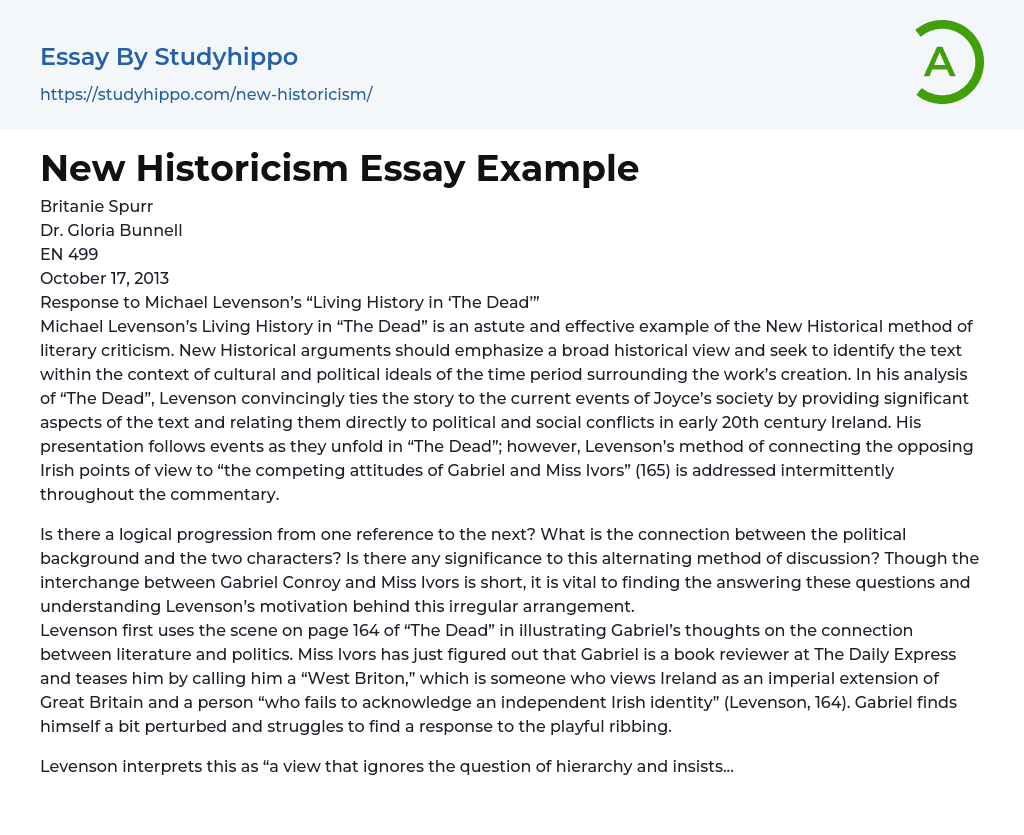

Response to Michael Levenson’s “Living History in ‘The Dead’” Essay Example
Michael Levenson’s Living History in “The Dead” is an astute and effective example of the New Historical method of literary criticism. New Historical arguments should emphasize a broad historical view and seek to identify the text within the context of cultural and political ideals of the time period surrounding the work’s creation.
In his analysis of “The Dead”, Levenson convincingly ties the story to the current events of Joyce’s society by providing significant aspects of the text and relating them directly to political and social conflicts in early 20th century Ireland. His presentation follows events as they unfold in “The Dead”; however, Levenson’s method of connecting the opposing Irish points of view to “the competing attitudes of Gabriel and Miss Ivors” (165) is addressed intermittently throughout the commentary.
Is there a logical progression from one referenc
...e to the next? What is the connection between the political background and the two characters? Is there any significance to this alternating method of discussion? Though the interchange between Gabriel Conroy and Miss Ivors is short, it is vital to finding the answering these questions and understanding Levenson’s motivation behind this irregular arrangement.
Levenson first uses the scene on page 164 of “The Dead” in illustrating Gabriel’s thoughts on the connection between literature and politics. Miss Ivors has just figured out that Gabriel is a book reviewer at The Daily Express and teases him by calling him a “West Briton,” which is someone who views Ireland as an imperial extension of Great Britain and a person “who fails to acknowledge an independent Irish identity” (Levenson, 164). Gabriel finds himself a bit perturbed and struggles to find a response to the playful ribbing
Levenson interprets this as “a view that ignores the question of hierarchy.
- Business Law essays
- Contract essays
- Consumer Protection essays
- Property essays
- Ownership essays
- Agreement essays
- Common Law essays
- Contract Law essays
- Justice essays
- Security essays
- Tort Law essays
- United States Constitution essays
- Crime essays
- Lawsuit essays
- Treaty essays
- Family Law essays
- Marijuana Legalization essays
- Constitution essays
- War on Drugs essays
- Court essays
- Jury essays
- Police essays
- Protection essays
- Community Policing essays
- Criminal Law essays
- Judge essays
- Lawyer essays
- Employment Law essays
- Copyright Infringement essays
- Injustice essays
- Intellectual Property essays
- Breach Of Contract essays
- Jurisprudence essays
- Social Injustice essays
- Juvenile Justice essays
- Internet Privacy essays
- Cyber Security essays
- Bill Of Rights essays
- Civil Liberties essays
- First Amendment To The United States Constitution essays
- Fourth Amendment To The United States Constitution essays
- Second amendment essays
- Animal Cruelty essays
- Law Enforcement essays
- Juvenile Justice System essays
- Surveillance essays
- Forensic Science essays
- Crime Prevention essays
- Criminal Justice essays
- Criminology essays



